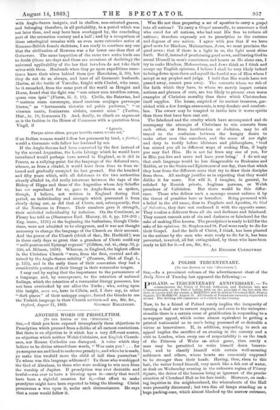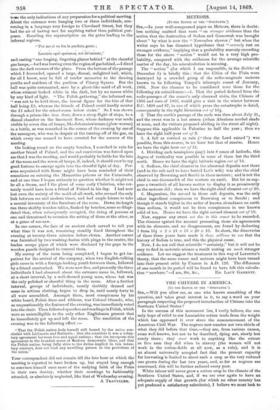A POLISH TERCENTENARY. [TO THE EDITOR OF THE "SPECTATOR.")
Sift,—In a prominent column of the advertisement sheet of the Daily News of Tuesday last appeared the following :—
POLAND. — TERCENTENARY ANNIVERSARY. — To commemorate the Union of Poland, Lithuania, and Ruthenia into *nu Commonwealth, at the Diet of Lublin, 1569, on the principle of the free with the free, of equals with the equals, a MEETING will be held at Cleveland Hall, Fitzroy Square, TO-MORROW, August 11. All friends of Poland are earnestly requested to at:end. The Meeting will commence at 8 o'clock in the evening.
Now, to be a friend of Poland surely implies the incapacity of turning a deaf ear to earnest requests, and even to the unimpres- sionable there is a certain sense of gratification in responding to a newspaper appeal, which seems almost equivalent to getting a printed testimonial as to one's being possessed of so desirable a virtue as benevolence. If, in addition, responding to such an appeal implies the sacrifice of an evening in the country and a visit to London, when every one of respectability is on the track of the Princess of Wales or. other game, then surely a man may be permitted to write himself down benevo- lent, and to classify himself with certain well-meaning noblemen and others, whose hearts are commonly supposed to be stronger than their heads. Having, then, risen to this bait, the writer found himself, very much like a fish out of water, at dusk on Wednesday evening in the unknown region of Fitzroy Square, the driver of the hansom being as ignorant of the precise situation of Cleveland Hall as his fare inside. However, on mak- ing inquiries in the neighbourhood, the whereabouts of the Hall were presently discovered ; but two dim oil lamps standing on a huge packing-case, which almost blocked up the narrow entrance,
were the only indications of any preparation for a political meeting. About the entrance were hanging two or three individuals, con- versing in a language very foreign to Cleveland Street, but they had the air of having met for anything rather than political pur- poses. Recalling the superscription on the gates leading to the infernal regions, "Per me si va fra la perduta gente ; Lasciate ogni Speranza, voi ch'entrate,"
and casting " one longing, lingering glance behind" at the cheerful gas lamps,—for I was leaving even the region of gas behind,—I dived into the dark recesses of the place. From the bottom of the passage which I descended, opened a large, dismal, unlighted hall, which, for all I know, may be full of tender memories to the dancing youths and maidens of the purlieus of Fitzroy Square. But the hall was quite untenanted, save by a ghost-like maid of all work, whose raiment looked white in the dark, but by no means white by any kind of light. " The Polish gathering," she informed me, " was not to be held there, the lowest figure for the hire of that hall being £3, whereas the friends of Poland could hardly muster the £1 asked for the school-room below stairs." So I was shown through a prison-like iron door, down a steep flight of steps, to a dismal chamber on the basement floor, whose darkness was made visible by seven dim oil lamps, like Johanniswiirmen (glow-worms) in a bottle, as was remarked in the course of the evening by one of the managers, who was in despair at the turning-off of the gas, on which every one seemed to have counted for the success of the meeting.
On looking round on the empty benches, I searched in vain for another friend of Poland, and the sad conviction was forced upon me that I was the meeting, and would probably be liable for the hire of the room and the seven oil lamps, if, indeed, it should ever be my good fortune to emerge again into the cheerful light of day. Per- sons acquainted with Rome might have been reminded of their sensations on entering the Mamertine prisons or the Catacombs, and at one time I began seriously to question whether it might not be all a dream, and I the ghost of some early Christian, who cer- tainly would have been a friend of Poland in his day. I had now lost even the society of the maid-of-all-work, who seemed the only link between me and modern times, and had ample leisure to take a mental inventory of the furniture of the room. Down its length ran three shabby wooden tables, flanked by benches, some so dilapi- dated that, when subsequently occupied, the rising of persons at one end threatened to occasion the setting of those at the other, as at a game of see-saw.
In one corner, the face of an ancient clock served to tell you what time it was not, remaining steadily fixed throughout the evening at twenty-three minutes before eleven. Another corner was furnished by two washing-basins with plugs in the centre, the leaden escape pipes of which were disclosed by the gaps in the wooden panels designed to conceal them.
My survey of the room being completed, I began to get im- patient for the arrival of the company, when two English-talking girls came in with a foreign-looking youth between them, followed by a friend unattached. We were now five, and presently the three individuals I had observed about the entrance came in, followed, at a short interval, by a well-dressed young man, whose hat was the only polished or cheerful thing in the room. After a further interval, groups of individuals, mostly shabbily dressed and some in artizan clothing, began to drop in, until nearly forty in all were assembled. Amongst them, most conspicuous by his white beard, Polish dress and ribbons, was Colonel Oborski, who, as unquestionably the feature of the evening, was immediately voted into the chair. Then followed speeches and readings in Polish, which were so unintelligible to the only other Englishman present that he immediately got up and left the room. The resolution of the evening was to the following effect :— " That the Polish nation feels herself still bound by the union con- cluded with Lithuania and Ruthenia ; that she considers it was a volun- tary agreement between free and equal nations ; that she interprets this agreement in the broadest sense of modern democratic ideas, and that the Polish nation, being fully alive to the duties implied in this volun- tary contract, does not bind any unwilling person to the provisions of the union."
Your correspondent did not remain till the late hour at which the meeting is reported to have broken up, but stayed long enough to convince himself once more of the undying faith of the Poles in their own destiny, whether their meetings be fashionably attended, or absolutely neglected, like that of Wednesday evening.
A TRAVELLER.































 Previous page
Previous page